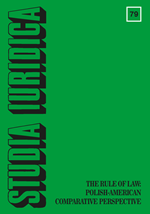Constitution, Judicial Review, and the Rule of Law in the Jurisprudence of Administrative Courts in Poland
Constitution, Judicial Review, and the Rule of Law in the Jurisprudence of Administrative Courts in Poland
Author(s): Marcin WiącekSubject(s): Constitutional Law, Sociology of Law
Published by: Wydawnictwa Uniwersytetu Warszawskiego
Keywords: rule of law; Constitution; administrative courts; Supreme Administrative Court; Constitutional Tribunal; application of the Constitution; judicial review of law
Summary/Abstract: In the light of Article 184 of the 1997 Constitution administrative courts verify the lawfulness of administrative decisions and some other acts of public administration. Furthermore, administrative courts may review the lawfulness, including the compliance with the Constitution, of the so called “enactments of local law” (referred to in Articles 87(2) and 94 of the Constitution). Pursuant to Article 8(2) of the Constitution “The provisions of the Constitution shall apply directly, unless the Constitution provides otherwise”. This constitutional competence is addressed, inter alia, to courts. In practice, administrative courts apply Constitution in three ways: 1) pro-constitutional interpretation of laws, 2) referring the so called questions of law to the Constitutional Tribunal, 3) ruling in a case directly on the basis of a constitutional provision. The provision applied by administrative courts in most cases is Article 2 of the Constitution, which stipulates that “The Republic of Poland shall be a democratic state governed by the rule of law (…)”. The Article is focused on most important cases in which the rule of law principle was applied. Administrative courts, as well as other courts and the Constitutional Tribunal, consider the rule of law principle to be the source of several detailed principles, e.g. the certainty of law, the lex retro non agit principle, the loyalty of the State towards citizens, the citizens’ trust in the State and the law, the principle of proportionality. Each of these principles was referred to in the large number of administrative courts’ judgments as the basis of a ruling. This proves that the Constitution, in particular the rule of law principle, is one of the instruments utilized by administrative courts’ judges in their everyday work.
Journal: Studia Iuridica
- Issue Year: 2019
- Issue No: 79
- Page Range: 92-106
- Page Count: 17
- Language: English

